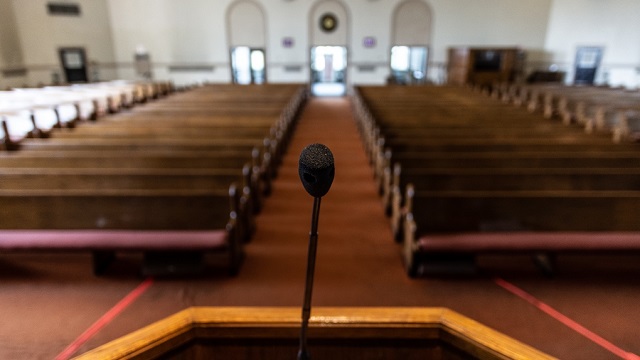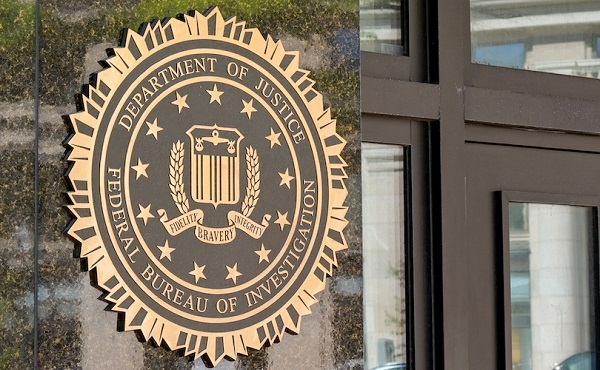Censorship Industrial Complex
“Minority Report”: The Sequel. A warning to the Canadian Church

From the Frontier Centre for Pubic Policy
In the 2002 futuristic movie, “Minority Report,” viewers are introduced to a ground-breaking technology that allows law enforcement to preview a crime before it is committed. Then this determination becomes the basis for the arrest and the sentencing of the “pre-crime” perpetrator.
In a case of life imitating art, on February 26, the Canadian government tabled legislation containing provisions that are eerily like the plot imagined in Tom Cruise’s blockbuster.
The proposed legislation should be of great concern to churches and pastors who may face unprecedented legal exposure if it is passed.
Bill C-63, the Online Harms Act, seeks to “promote online safety.” The Act endeavours, in part, to protect children from online sexual exploitation and requires the mandatory reporting of online child pornography by internet providers. So far, so good.
But the proverbial devil is lurking in the details of the provisions pertaining to online hate speech, which are simply breathtaking.
The Act represents what many consider to be the most dangerous assault on free speech this country has ever seen, prompting Canadian novelist, Margaret Atwood, to refer to the proposed legislation as “Orwellian.”
This bill would not only have a glacial effect on free speech, but it would also trigger an open season on religious organizations that do not align with mainstream dogma.
Here are some of the reasons behind this apocalyptic assessment of this piece of legislation.
The bill defines hate speech as speech that “is likely to foment detestation or vilification of an individual or group of individuals on the basis of a prohibited ground of discrimination.”
This definition is so vague, ambiguous, and far reaching that it could apply to any opinion that diverges from the government-sanctioned media narrative.
The responsibility of judging complaints would be lodged with the Human Rights Commission. This fact alone is deeply worrisome, as the threshold for deciding guilt is much lower in the Human Rights Tribunal than in a criminal court, where a person must be found guilty beyond a reasonable doubt.
Plaintiffs could file their complaints anonymously without incurring any legal costs. Defendants, on the other hand, would be bound to retain legal counsel at considerable expense to them.
Should they win their case, the plaintiffs stand to be awarded up to $20,000. The defendants could be imposed an additional fine of up to $50,000. Should a legal violation be considered to have been motivated by hate, the defendants could also face life imprisonment!
The incontrovertible proof that Bill C-63 is not about protecting children but strangling free speech resides in what is now ironically referred to as the “Minority Report” provision.
As unhinged as it sounds, the legislation states that if a member of the public has grounds to believe that someone is likely to engage in hateful speech, that person can appeal to a provincial judge who may then subject the defendant to house arrest and other restrictions.
Human nature being what it is, there is no telling the number of people who will be incentivized to file complaints knowing they have much to gain and nothing to lose.
Conservative churches would become instant targets in the tsunami of human rights violation initiatives that the proposed legislation would trigger.
In response, churches may decide to play it safe by restricting their services to in-person participation or by self-censuring.
While either choice would no doubt be welcome by a government that wants to silence those who hold “unacceptable views,” to quote Prime Minister Justin Trudeau, such restrictions would no doubt prove to be detrimental to the churches and the common good.
The proposed legislation is not about protecting children. It’s about unleashing the mob against those who would oppose an agenda that is already proving to be an existential threat to liberal society.
Bill C-63 is currently at the nexus of the fight to preserve our most fundamental freedoms, Canadian democracy, and the well-being of future generations.
Churches have a window of opportunity to voice their opposition to this appalling piece of legislation.
What can be done?
First, be informed. Videos posted by the Canadian Constitution Foundation are a great place to start.
Second, promote congregational awareness. Church leaders can no longer pretend that such issues are beyond the scope of their pulpit. To denounce injustice is indeed part and parcel of the church’s prophetic mandate.
Third, church members should contact their member of parliament to express their opposition to Bill C-63.
Canadian churches have historically chosen to remain on the far edges of the culture war currently raging in the Western world. But if Bill C-63 receives royal assent, these same churches may soon unwittingly find themselves in the middle of the very battlefield they so vigorously sought to avoid.
Pierre Gilbert is Associate Professor Emeritus at Canadian Mennonite University.
Censorship Industrial Complex
Global media alliance colluded with foreign nations to crush free speech in America: House report

From LifeSiteNews
By Dan Frieth
The now-defunct ad coalition GARM shared insider data and urged boycotts of Twitter to punish non-compliance with its ‘harmful content’ standards, a US House Judiciary report shows.
A new report from the U.S. House Judiciary Committee has shed light on what it describes as an alarming collaboration between powerful corporations and foreign governments aimed at suppressing lawful American speech.
The investigation focuses on the Global Alliance for Responsible Media (GARM), an initiative founded in 2019 by the World Federation of Advertisers (WFA), which the committee accuses of acting as a censorship cartel.
According to the report, GARM, whose members control about 90 percent of global advertising spending, exploited its market dominance to pressure platforms like Twitter (now X) into compliance with its restrictive content policies.
A copy of the report can be found HERE.
The committee highlighted how GARM sought to “effectively reduce the availability and monetization” of content it deemed harmful, regardless of public demand for free expression.
Documents obtained by the committee reveal direct coordination between GARM and foreign regulators, including the European Commission and Australia’s eSafety commissioner.
In one exchange, a European bureaucrat encouraged advertisers to leverage their influence to “push Twitter to deliver on GARM asks.”

Similarly, Australia’s eSafety Commissioner Julie Inman Grant praised GARM’s “significant collective power in helping to hold the platforms to account” and sought updates to “take into account in our engagement and regulatory decisions.”

Robert Rakowitz, GARM’s co-founder and initiative lead, expressed a chilling goal in private correspondence, stating that silencing President Donald Trump was his “main thing” and likening the president’s speech to a “contagion” he aimed to contain “to protect infection overall.”

The report outlines how GARM distributed previously unavailable non-public information about Twitter’s adherence to its standards, fully aware this would prompt advertisers to boycott the platform if it failed to conform. According to the House report, Rakowitz admitted that this information sharing was designed to encourage members not to advertise on Twitter.
He went as far as to draft statements urging GARM members to halt advertising on the platform, telling colleagues he had gone “as close as possible” to saying Twitter “is unsafe, cease and desist.”
Despite the widespread impact of GARM’s actions, including what the committee describes as coerced “concessions” from platforms, internal polling circulated within GARM showed that “66 percent of American consumers valued free expression over protection from harmful content.”
Still, GARM pressed ahead with efforts to “eliminate all categories of harmful content in the fastest possible timing,” ignoring consumer preferences.
Even after GARM dissolved in 2024 amid legal challenges, similar efforts persisted.
A new coalition led by Dentsu and The 614 Group briefly attempted to revive GARM’s mission before disbanding under scrutiny. Gerry D’Angelo, a former GARM leader, reflected on the initiative’s overreach, stating, “Did we go too far in those first rounds of exclusionary restrictions? I would say yes.”
The Judiciary Committee warns that despite GARM’s downfall, the threat of collusion to stifle free expression remains.
It pledged to continue oversight to defend “the fundamental principles” of the Constitution and ensure that markets, not coordinated censorship efforts, shape the flow of information in the digital age.
Reprinted with permission from Reclaim The Net.
Censorship Industrial Complex
FBI urged to release withheld records on Hunter Biden laptop, other ‘Twitter Files’

From LifeSiteNews
By Dan Frieth
Judicial Watch initiated the lawsuit in April 2023, targeting the DOJ, the Department of Homeland Security, and the Office of the Director of National Intelligence
A hearing took place Wednesday, before U.S. District Judge Sparkle L. Sooknanan, in a Freedom of Information Act (FOIA) lawsuit brought by Judicial Watch against the Department of Justice (DOJ).
The case seeks records related to the “Twitter Files,” particularly those involving Hunter Biden’s laptop and allegations of censorship.
The only matter still pending is the FBI’s withholding of records detailing two meetings between agency officials and Twitter representatives from the Biden administration.
Judicial Watch initiated the lawsuit in April 2023, targeting the DOJ, the Department of Homeland Security, and the Office of the Director of National Intelligence.
The legal action followed the FBI’s failure to respond to a December 2022 FOIA request for communications between FBI personnel and key Twitter figures, including Yoel Roth, Vijaya Gadde, and Jim Baker, from June 2020 to December 2022.
These individuals were involved in discussions about suppressing the New York Post’s Hunter Biden laptop story, as disclosed in journalist Matt Taibbi’s December 2022 “Twitter Files.”
Tom Fitton, president of Judicial Watch, expressed strong disappointment: “It is frustrating beyond belief for Judicial Watch to have to go to federal court for basic information on Biden’s abuse of the FBI, using Twitter to censor and monitor Americans.”
Through a mix of FOIA requests and legal action, Judicial Watch continues to document extensive censorship efforts that affected tens of millions of Americans.
In November 2024, it obtained DHS records showing a widespread campaign, by both government and private groups, to police and suppress social media posts concerning election fraud in 2020.
Additional records from June 2024, released through Judicial Watch litigation, revealed that just before and after the 2020 election, state officials flagged alleged misinformation and sent it to entities like the Center for Internet Security, CISA, and the Election Integrity Partnership (EIP), a DHS-backed nonprofit known for targeting online election discourse.
In December 2023, DHS documents exposed coordination between CISA and the EIP to conduct “real-time narrative tracking” on major social media platforms in the run-up to the 2020 vote.
Similar records surfaced in November 2023, showing EIP’s influence over platforms such as Google, Twitter, Facebook, TikTok, Pinterest, and Reddit to suppress “disinformation.”
Reprinted with permission from Reclaim The Net.
-

 Alberta7 hours ago
Alberta7 hours agoAlberta Independence Seekers Take First Step: Citizen Initiative Application Approved, Notice of Initiative Petition Issued
-

 Crime6 hours ago
Crime6 hours agoNational Health Care Fraud Takedown Results in 324 Defendants Charged in Connection with Over $14.6 Billion in Alleged Fraud
-

 Health5 hours ago
Health5 hours agoRFK Jr. Unloads Disturbing Vaccine Secrets on Tucker—And Surprises Everyone on Trump
-

 Bruce Dowbiggin8 hours ago
Bruce Dowbiggin8 hours agoThe Game That Let Canadians Forgive The Liberals — Again
-

 Alberta1 day ago
Alberta1 day agoCOVID mandates protester in Canada released on bail after over 2 years in jail
-

 armed forces1 day ago
armed forces1 day agoCanada’s Military Can’t Be Fixed With Cash Alone
-

 Crime2 days ago
Crime2 days agoProject Sleeping Giant: Inside the Chinese Mercantile Machine Linking Beijing’s Underground Banks and the Sinaloa Cartel
-

 Alberta2 days ago
Alberta2 days agoAlberta uncorks new rules for liquor and cannabis






